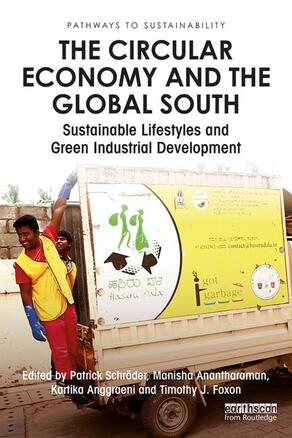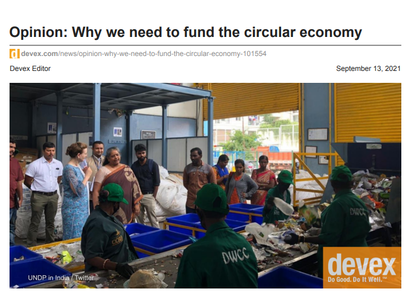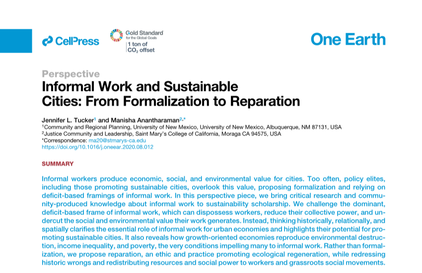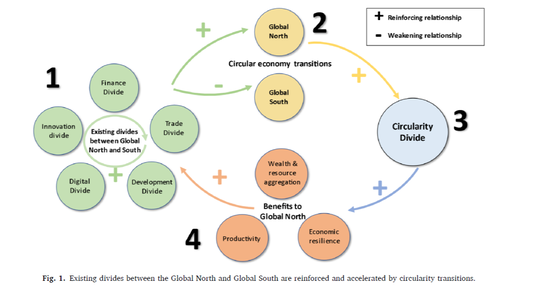Circular Economy and Informal Work
|
This theme of my research connects informal waste economies with global environmental governance in the circular economy. Circular economy is a global sustainability strategy pursued by national governments and multinational corporations looking to reconcile ecological concerns with economic growth imperatives. This project, conducted in collaboration with Patrick Schroeder at Chatham House explores a significant gap in circular economy scholarship and practice--the lack of engagement with the global geographies of work in waste-value chains and the global justice outcomes of circular economy proposals.
As I explain in a chapter for The Oxford Handbook of Comparative Environmental Politics, while most circular economy policies and plans, particularly in Europe, are articulated at the municipal, regional and national scales, waste-value chains are in reality transnational. Goods manufactured in Asia are consumed in Europe and when discarded, often end up back in Asian, African and South American cities, where a large informal economy extracts, processes and revalorizes waste as resource. Any attempt to reduce material footprints by closing loops will have to contend with these already-existing circuits and practices of resource circularity. My co-edited volume The Circular Economy and the Global South make a key contribution to this field by centering practitioner perspectives and articulating the need to center “already-existing circularities” in the informal economy in global sustainability and climate governance. |
Featured article- Informal Work and Sustainable Cities: From Formalization to Reparation, One Earth, 2020 (open access)
The circularity divide: What is it and how do we avoid it? Resources Conservation and Recycling, 2022
|

Circular Economy and the Global South (Routledge 2019) is amongst the first books to examine the diversity of resource conservation, reuse and recycling practices carried out by communities in the global South in relation to an emerging global movement advocating a transition to a Circular Economy, led by businesses and policy-makers in the global North.
This volume highlights examples of circular economy practices in developing country contexts in relation to small and medium enterprises (SMEs), informal sector recycling and national policy approaches. It examines a broad range of case studies, including Argentina, Brazil, China, Colombia, India, Indonesia, Kenya, South Africa, and Thailand, and illustrates how the circular economy can be used as a new lens and possible solution to cross-cutting development issues of pollution and waste, employment, health, urbanisation and green industrialisation. In addition to more technical and policy oriented contributions, the book also critically discusses existing narratives and pathways of the circular economy in the global North and South, and how these differ or possibly even conflict with each other. Finally, the book critically examines under what conditions the circular economy will be able to reduce global inequalities and promote human development in the context of the Sustainable Development Goals.
This volume highlights examples of circular economy practices in developing country contexts in relation to small and medium enterprises (SMEs), informal sector recycling and national policy approaches. It examines a broad range of case studies, including Argentina, Brazil, China, Colombia, India, Indonesia, Kenya, South Africa, and Thailand, and illustrates how the circular economy can be used as a new lens and possible solution to cross-cutting development issues of pollution and waste, employment, health, urbanisation and green industrialisation. In addition to more technical and policy oriented contributions, the book also critically discusses existing narratives and pathways of the circular economy in the global North and South, and how these differ or possibly even conflict with each other. Finally, the book critically examines under what conditions the circular economy will be able to reduce global inequalities and promote human development in the context of the Sustainable Development Goals.
Global Repairation Fund

Alongside research, I am developing transformative policy proposals to aid in a just and inclusive circular economy transition.
One such proposal is to commission a global repairation fund, an attempt to enact reparations to informal waste workers through the circular economy. In a 2021 opinion piece, I argued that the fund could provide investments and financing for informal economy repair, recycling and remanufacturing initiatives in the global South.
My research and stakeholder engagement with grassroots waste picker groups in India shows that lack of access to credit and commercial finance is one of the biggest barriers preventing informal organizations from participating in value-adding circular economy repair and remanufacturing activities. When informal recyclers and waste pickers lack access to finance to improve operations and equipment, work conditions cannot improve and resource recovery will be marginal. A global repairation fund tries to fix this.
One such proposal is to commission a global repairation fund, an attempt to enact reparations to informal waste workers through the circular economy. In a 2021 opinion piece, I argued that the fund could provide investments and financing for informal economy repair, recycling and remanufacturing initiatives in the global South.
My research and stakeholder engagement with grassroots waste picker groups in India shows that lack of access to credit and commercial finance is one of the biggest barriers preventing informal organizations from participating in value-adding circular economy repair and remanufacturing activities. When informal recyclers and waste pickers lack access to finance to improve operations and equipment, work conditions cannot improve and resource recovery will be marginal. A global repairation fund tries to fix this.
New research!
|
Bringing a critical, interdisciplinary lens to the circular economy, my ongoing research project explores how waste pickers and informal recyclers, relegated to the margins in “modernized” municipal waste management systems, are navigating global recycled-material value chains by building partnerships with multinational brands, global development organizations and social enterprises.
Today, global development organizations like the World Bank and brands like Coca Cola promote including informal recyclers in the circular economy as a win-win best practice, able to secure livelihoods and provide economic and environmental benefits. Yet, my research alongside waste picker organizations in Bengaluru shows that inclusion initiatives can exacerbate inequality within the informal economy, enabling some individuals to access increased incomes and social mobility, while relegating a majority of informal recyclers to the margins of global flows. To upgrade and improve the conditions of informal work through circular economy partnerships, new modes of thinking and engaging informal waste work are needed. Circular economy policy-making and thought-leadership centered in the Global North has consistently failed to include the perspectives of Global South informal workers -- resulting in a democratic deficit that exacerbates colonial and racialized inequities in environmental policy-making. Involving fieldwork in Tunis, Tunisia, Rabat, Morocco and Bengaluru, India, the findings of this research will contribute to theoretically-grounded, change-oriented research seeking to understand and intervene in informal waste work processes in the context of a global sustainability transition, as well as new knowledge on precarious urban work and the pathways toward pro-poor, sustainable urban economies. |


